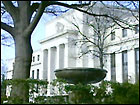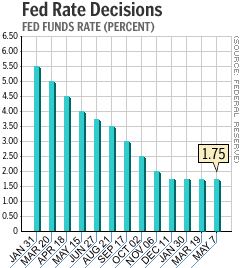
NEW YORK (CNN/Money) - Don't expect a holiday gift from the Federal Reserve.
That's the call from Lehman Brothers, whose economists are betting that the first interest rate hike in two-and-a-half years will come in December, a month when central bankers have never raised borrowing costs.
The Fed won't comment on its apparent tradition of avoiding holiday-time rate hikes. But policy makers have always passed on boosting borrowing costs in December, when retailers pine for unbridled consumer spending.
"I don't think the Fed is going to withhold raising rates just because it's December," said Lehman economist Joe Abate, who calls past December inaction more coincidence than plan.

Lehman expects the economy to have enough momentum late this year to allow policy makers to lift the overnight intra-bank lending rate above a 40-year low of 1.75 percent. The unemployment rate will have peaked, consumer spending will have held steady and the ailing stock market's predicted economic damage will have proven overblown, Lehman is betting
Lehman is hardly alone in forecasting higher rates. But its Dec. 10 meeting target for the Fed's first hike since 2000 stands out. December, after all, is the month when the Fed has made the most cuts: six.
Of the 22 primary bond dealers surveyed by Reuters, two are calling for the Fed's rate hike cycle to begin in August, while six more predict September. Eleven forecast the first jump in borrowing costs in November. And three firms say the Fed's on hold all year.
But Lehman is the only firm to predict the Fed will start hiking rates during the holiday season.
Anthony Chan, chief economist at Banc One Investment Advisors, says the Fed has stayed sidelined in December for a reason.
"You don't want to hit the economy when the impact of a rate hike can be magnified," he said. "Monetary policy seems to have a greater impact in December."
Still, Chan, who is looking for the Fed to first move in November, won't rule out a pre-holiday lift in borrowing costs if economic conditions merit.
Since the Fed began directly controlling short-term rates in 1990, two other months have been rate-hike free: September and October. Fed watchers attribute this to central bankers not wanting to influence federal elections occurring every two years in November.
"The only argument that holds up is a political one," Lakshman Achuthan, economist at the Economic Cycle Research Institute, said.
Lehman's Abate allows that the Fed might hold off in December if they were "uncertain about the strength of the consumer during the holiday season." And he puts the odds of a rate cut at 25 percent.
Abate points out that in 1999 -- the last time the Fed, in the midst of a rate-hike cycle, took a December pass -- policy makers were thought to be wary of possible Y2K disruptions.
The central bank, which last raised rates in May, 2000, cut them 11 times last year.
When 2001 began, the Fed, which meets Tuesday, was widely forecast to have begun hiking rates by now.
Those forecasts keep getting pushed back as the economy's recovery looks more and more fragile.
Those forecasts may finally change by December. And if Lehman is right, the Fed's first-ever holiday rate hike may even signal that central bankers feel certain that the economy is truly on the mend.
Not a bad present.

|

